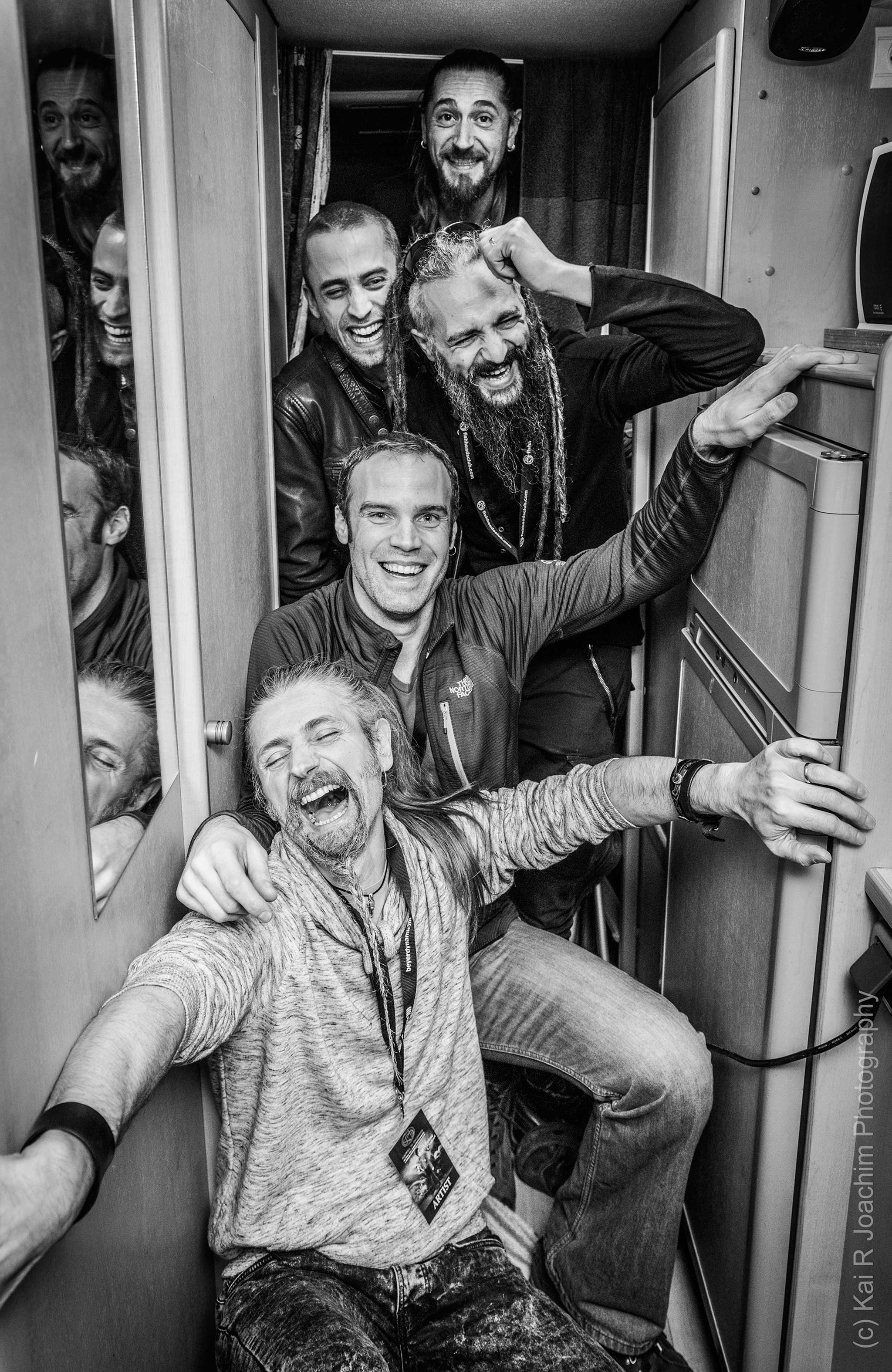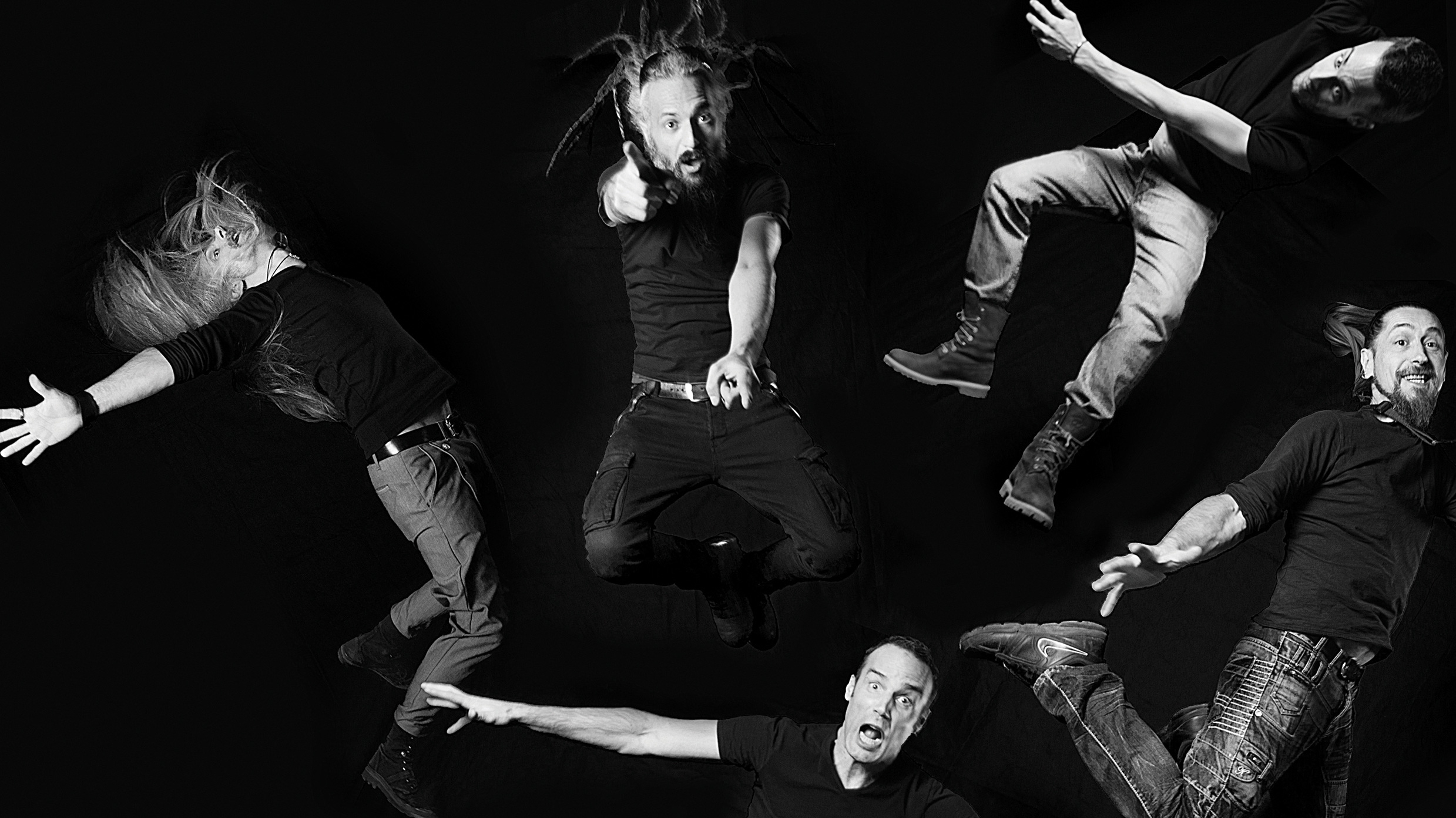Ever since the release of their 2014 album Tant Que L’Herbe Est Grasse and their first appearance in these pages, Lazuli have become arguably the first French prog band to make waves in the UK since Ange.
No small feat for a self-released band now entering their 18th year in existence, an existence that was confined for a long time in the sunny south of France. This new-found success has been, according to guitarist and vocalist Dominique Leonetti, more beneficial to the band than any English lesson.
“Well, let’s say the two UK tours we did in 2014 and 2015 [with Fish] have been much better for me than all my English courses in high school!” he laughs, before recalling the difficulties they faced when speaking to Fish’s staff.
“There were people from Scotland, Wales and various parts of England, all with their own expressions and accents,” Leonetti explains. “From time to time, you could tell even they had a hard time understanding each other! So I think we did pretty good, considering the circumstances. We even learnt to appreciate the beauty of your national institution known as breakfast, much to our sound engineer’s dismay! Besides, our keyboard player Romain [Thorel] now visits the UK regularly as he’s dating Fish’s daughter, whom he met on that trek, so his English has improved a lot too for obvious reasons…”
The warm welcome Lazuli have received in the UK is a personal achievement not only for the band but also for Leonetti himself, who says he has always looked to the country’s rich musical heritage for inspiration. In fact, it was because of some of Her Majesty’s most esteemed subjects that he became an artist.
“To me, the UK will always be the land of The Beatles,” says Leonetti. “I was about 10 when I first heard A Day In The Life and I was instantly overwhelmed by that part where the orchestra goes crazy midway. It felt like I’d been going through my life in black and white and that all of a sudden, the Fab Four turned everything into colour. Ever since, I’ve been trying to emulate the epiphany I had that day.”
Coincidentally, the UK was also where Leonetti had his first experience of performing. “I did a school exchange when I was about 15 and that’s when I went to London for the first time,” he remembers. “I had my very first acoustic guitar with me and being the young, full of hormones, careless teenager that I was, I did my first ever gig during that trip with a friend of mine who also played guitar. We played a few originals along with selected covers in a pub in front of a few punters.
“It’s all a blur now and I don’t remember much of it, but the fact that after three decades I would come back to the same city fronting my own band means a lot to me. Plus, I think the music fans are far more open-minded here, yet don’t get enough credit for that. We’ve been told many times that sticking to our mother tongue would ruin our chances of reaching an audience outside of France but the UK crowd has proven that music truly remains a universal language. Last March, we even received two awards from the Classic Rock Society for Best Overseas Band and Best Live Act, and we’re very grateful for everything we’ve experienced on the other side of the Channel.”
They’re a busy bunch: new album Nos Âmes Saoules (translated into English as ‘Our Drunken Souls’) has arrived less than two years after their previous album, Tant Que L’Herbe Est Grasse. Even Leonetti agrees that they hadn’t planned to release a new album so quickly. But taking advantage of a “spontaneous outburst of creativity”, and with their own studio at their disposal – called ‘L’Abeille Rôde’, another play on words paying tribute to Leonetti’s beloved Beatles – they committed this batch of new songs to tape at their own pace.
All of the songs were written by Leonetti. “You’re right but let me stress that Nos Âmes Saoules is more than ever a collective effort and that’s why it flows so easily,” he adds. “As individuals, none of us tried to get the best of the deal, but instead vowed to be at the service of the songs and at their service only. That’s why the arrangements are so stripped down or why we dared to open the album with a song where the first three minutes feature only my vocals and a piano, for instance. I’m the one to blame for its most proggish moment, the second half of Chaussures Á Nos Pieds. I was so thankful to my comrades for being so supportive of my vision that I handed over the reins to them for that song, urging them to go crazy. And they did.”
The joie de vivre that emanates from the Lazuli frontman is replaced with a darker tone when he adds: “A lot of the songs have acquired a different and stronger meaning since we recorded them, considering all the terrible events that occurred later on.”
He’s referring, of course, to the terror attacks that took place in Paris in January and November last year. On the album’s first track, Le Temps Est Á La Rage (It’s Time To Rage), he mourns, ‘Je vois les hommes/Contre les Hommes/Partout/L’homme/Pour L’Homme/Un Loup’ (‘I see men against men, everywhere, man is a wolf to man’).
“When the shooting happened at Le Bataclan, the album was already done and we were in Germany with Fish,” remembers Leonetti. “We received the news after the show and once we were back at the hotel, I don’t think any of us slept much that night. The following day, Romain improvised on the piano they had in the lobby and came up with the main theme of that song. We filmed it and decided to post the video on our Facebook page, with part of the lyrics attached. I guess that was the only way we found to express our feelings towards what had happened.”

The Grim Reaper looms over Nos Âmes Saoules. From the aforementioned Le Temps Est Á La Rage to Vita Est Circus,
where a clown dies in solitude, or Le Mar Du Passé, that pillories the rise of right-wing extremists in last year’s regional elections, at least on a lyrical level, the album contrasts with Dominique’s positive outlook. And then there’s the special dedication in the album’s booklet…
“Her name was Patricia,” he reveals, before pausing, caught up by emotion for a second. “She was a supporter of Lazuli from day one and came to many of our shows up to the point when she became almost like family to us. Tragically, she passed away last year and when we attended her funeral, we realised how much music – and how much our music – played a huge part in her life and we were very touched.
“Death was very present in our lives in 2015 and we just really needed to write about it, only to thumb our nose at it, like a catharsis if you will. It’s like that one song you’re mentioning [Le Mar Du Passé] about Le Front National [the French extreme right party]. We’ve had many discussions about this: is that an artist role to do such comment? But I said enough is enough and thankfully, my bandmates were very supportive. Actually, we’ve already played that song live a few times and at one gig, a friend of mine was next to somebody who conspicuously refused to applaud and it was obvious what his political opinion was. But I’m glad we performed it that night because who knows, maybe some of those words, even if they remain quite metaphorical, eventually reached him. At the very least, he listened to what I had to say.”
As if to move away from the solemnity of what he just said, Leonetti brightens up again, underlining how family is a huge part of Lazuli. His younger brother Claude is also in the band, playing ‘la léode’, a guitar-like instrument he invented, while their mother Maryse takes care of the administrative side of things. And Leonetti emphasises how, to them, music remains a positive force.
“Even if one thinks that our new album deals, consciously or not, with terrible events, there’s always hope to be found. Besides, look at us: it’s been a long, hard road to say the least, with many obstacles along the way. But we’re still here, happier than ever. So we’re planning to enjoy as much as possible every second of it.”
Nos Âmes Saoules is out now on Lazuli Music. See the band’s website for details.
